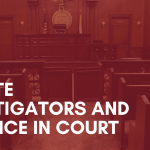Skip tracing is the process or practice of locating individuals who have defaulted or missed paying a debt. The person who performs this action is known as a skip tracer and is considered as their primary occupation when done professionally. Skip tracing is an essential approach since it helps individuals and businesses to locate debtors through skip tracers and reclaim their revenue.
Skip Tracing Techniques
Caller ID

This process entails sending emails to all addresses which the individual lives or might have lived before skipping town. The skip tracer might state that they urgently need to contact the debtor as soon as possible and leave a phone number. If the person in question ever contacts the skip tracer out of curiosity, the caller ID can capture the number and perform a reverse phone search to reveal their current physical address.
Reverse Telephone Directories
Skip tracers can use this method to enter phone numbers in these directories and an address linked to the phone number will be revealed. This process provides information only for listed numbers. Most skip tracers might use www.411.com for reverse directory services.
Acquaintances
Family, friends, relatives, neighbors or business associates of the debtor might provide significant and correct information about their whereabouts. Collecting information from this group can be difficult since they might have a close relationship with the debtor. However, they are the best group that can lead you directly to the debtor without undertaking other skip tracing approaches.
Directory Assistance
A skip tracer can also contact the directory assistance to ask for any phone numbers registered under other listings within the search area especially those that have the same last name. Such approaches are carried out when the current phone line used by the debtor has been disconnected.
Telephone Listings

It is important to check telephone listings for both online and printed directories to obtain phone numbers and physical addresses of the person in question. Landlines provide significant information and are therefore best to use in such situations.
Postal Service Change of Address
A skip tracer can mail an empty envelope to the address which was last used by the debtor and request a correction of the address instead of forwarding. The postal service will then provide the current address used by the debtor.
Vehicle Registrations
Vehicle, motorbikes, and boat registration information can be used to locate the address of the debtor.
Professional Licences
The skip tracer can visit the certifying agency for the debtor information if they were certified by the state organization.
Voter Registrations

Skip tracers can visit the local city government to obtain significant information on the debtor. The local city government has information such as official names, birth dates, and addresses for registered voters.
Search Engine
Debtor names and aliases can also be entered in search engines to see whether their personal information appears. Social media platforms can also be significant in providing information on their recent activities and whereabouts.
Criminal Search
A criminal search can reveal whether the person has been incarcerated or is on parole.
Corporate Filings
Corporate fillings might have significant information on the location of the company officers.
Third Party Trace
If the person had previously lived with another person, it would be significant for a skip tracer to visit the person since the debtor might have moved back to them.
References
Bragg, S. (2018, November 26). Skip tracing techniques. Retrieved from https://www.accountingtools.com/articles/2017/5/4/skip-tracing-techniques
Skip Tracing Jobs and Training. (n.d.). Retrieved from https://www.bountyhunteredu.org/what-is-skip-tracing/










